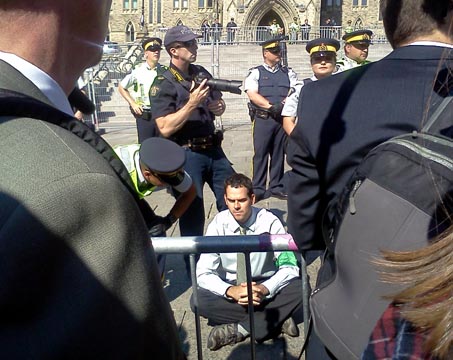Over 200 protesters objecting to the federal government’s enthusiastic support for Alberta’s tar sands and the Keystone pipeline XL were arrested Monday morning as they attempted to stage a sit-in in the House of Commons.
The protesters wanted the chance to air their grievances with the environmentally reckless policies of the Harper-led Conservatives inside Parliament but were blocked from entering by fenced barricades and over 50 RCMP officers.
The protesters were encouraged by hundreds of boisterous supporters as they passed the media scrum and calmly hopped over police barricades.
Those arrested in the first wave of protesters trying to gain access to the House included chairperson of The Council of Canadians, Maude Barlow, and Dave Coles, the president of Communications, Energy and Paperworkers Union, along with his executive assistant andrabble.ca blogger Fred Wilson.
Organizers want to deliver a strong message denouncing the Conservative government’s support for the Keystone XL pipeline and continuing tar sands development.
“We’re here today in solidarity with the multiple other NGOs, unions and every day citizens who decided to send a very united direct message to the Harper regime that we will not stand for this anymore,” said rally organizer and tar sands campaigner for the Indigenous Environmental Network Clayton Thomas-Mueller.
“We want energy justice, we want a zero carbon energy economy that doesn’t sacrifice certain communities for the benefit of shareholders of big private oil companies living thousands of miles away.”
No incidents of violence were reported and both sides in the rally behaved civilly, to the point that police placed a small step ladder on the far side of the barricade for protesters to safely descend.
“I think the police have conducted themselves in a peaceful way,” said Thomas-Mueller. “Their decision to only charge folks with trespassing versus a criminal charge, we definitely appreciate that.”
Thomas-Mueller noted the stark contrast of this peaceful protest with the turbulence of recent police and activist confrontations.
“This is a very welcome exchange from what we’ve seen in the G-20 and the Olympic mobilization where police definitely were a lot more hostile” says Thomas-Mueller, “so today was a good day.”
A diverse group of speakers kicked off the protest rally sharing their own personal stories of suffering from the colossal impact of the Alberta tar sands.
Chief of the Dene Nation, Bill Erasmus, spoke of the struggle that his community, which is 800 miles downstream of the tar sands, faces with water contamination and pollution.
“There are tailings ponds that total 700 square miles of toxic waste, that waste goes into the water system, we are downstream we feel it,” Erasmus said. “[Former Chief of the Mikisew Cree First Nation] George Poitras spoke of members in his community dying of cancer, we’re only a couple of miles downstream from them and we’re starting to feel it.”
“Canada wants to become the number one world producer of oil at our expense,” added Erasmus.
“It was a changed landscape forever,” said Melina Laboucan-Massimo, Climate and Energy campaigner for Greenpeace Canada about her Lubicon Cree community’s struggle with the Rainbow Oil pipeline leak this past spring.
“It consumed a whole stretch of our traditional territory, where my family once hunted, once trapped, once picked berried, once harvested medicine for generations and can no longer do it,” added Laboucan-Massimo.
The speakers shared a sense of frustration of being ignored by the Conservative government despite the scientific evidence and strong opposition against tar sands development.
“It is simply wrong to poison the fish and wildlife which indigenous people living downstream depend on for their livelihood thereby causing unprecedented high incidents of rare cancers in First Nations community, it is dead wrong,” Tony Clarke, the director of the Polaris Institute, said.
“The Harper government has taken its marching orders from Big Oil and has effectively shut out the voices of civil society.”

Communications, Energy and Paperworkers (CEP) Union president Dave Coles denounced the Harper government as foolish and incompetent for their Keystone pipeline projects.
“How the hell do you de-link jobs, the environment, the economy, First Nations rights? You can’t, it’s a package and you can’t put it in a pipe and ship it to Texas,” charged Coles. “Stephen Harper’s right, it’s a no-brainer — and he has no brains.”
Many in the crowd spoke of the need to fight back against the continued development of the tar sands by coming together and strengthening the opposition movement.
“This rally is about brining a common voice recognizing that the government is ignoring opposition to the tar sands development,” said Andrea Harden-Donahue, the Energy and Climate Justice Campaigner Council of Canadians, “The stronger our movement is the more power we will have.”
With the Conservatives controlling all levers of power in Ottawa, renegade page Brigitte Depape urged activists to use civil disobedience to oppose the Harper government.
“We have tried institutional means and they have failed, and we know change won’t happen in Parliament and we know it won’t happen from writing policy reports,” Depape said. “Change happens when we take action. We may not have the money and resources that government and companies have but we have people power.”
Marco Vigliotti is an Ottawa-based freelance journalist.



